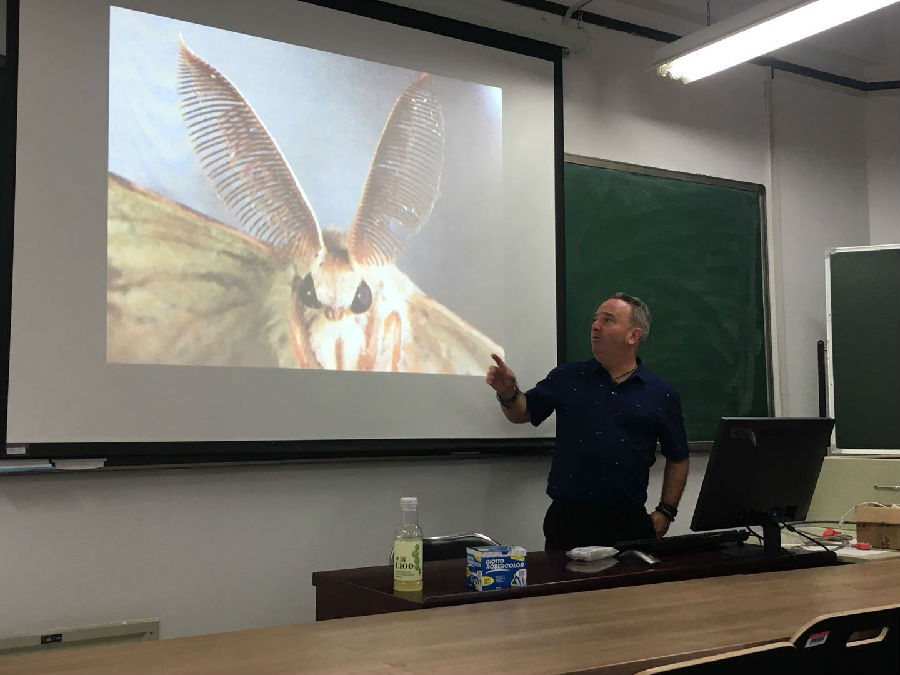Title: Molecular mechanism of insect chemosensory systems and human totipotent stem cells: RNA and protein editing
 Speaker:Dr.Jean-Francois Picimbon (QILU University of Technology)
Speaker:Dr.Jean-Francois Picimbon (QILU University of Technology)
Time: 4:00-5:00 pm, June28(Thursday), 2018
Place: Room B-302, Science Building
Contact:Stephen S.-T. Yau
Abstract:Studying chemosensory proteins (CSPs) of insects, we have discovered a high level of pinpoint mutations on the RNA sequence. Many of these mutations are tissue-specific, largely expressed in the sex pheromone gland, and induce subtle changes in the protein structure. We have found a similar high level of pinpoint mutations in the odor binding protein (OBP) families, thereby expanding the notion to the vast repertoire of protein carriers. This smoothly leads to the notion that RNA editing can bring new multiple functions in specific gene protein family, particularly in transporters of small organic molecules and receptor chaperons. In this conference talk at Tsinghua University, I would like to bring to discussion concepts and principles in which mutations are not seen as representative of disease or a deficient system, but a way for immune, sensory and/or totipotent cells to generate a gigantic diversity of protein variants in order to accomplish multi-function. This may not only be the evolutionary mechanism that leads insects (and microorganisms) for a successful adaptation to many different or changing environments. This may also be the prerequisite for a single cell to evolve into multicellular organisms and/or for a totipotent cell to generate any cell type of the body or any kind of tissue, under the most appropriate condition.
Short Bio:Distinguished Professor Jean-Fran?ois Picimbon (Jie Fu) is the Director of Agricultural Microbial Institute in the QILU University of Technology based in Jinan (Shandong Province, P.R. China). Disting. Professor Picimbon has published on the subject of insect pheromones and chemosensory proteins for neurobiology and insect pest control. He is a recognized expert (outstanding scientist from abroad, Taishan scholar) in the field of insect olfaction after conducting chemical ecology, biochemistry, molecular biology and structural biophysics studies in France, USA, Canada, Japan, Germany and Sweden. After obtaining a Doctorate Degree in Neurosciences from Marseille University in 1995, he started work as a postdoctoral researcher at the National Institute of Sericultural and Entomological Sciences in Tsukuba (STA fellow) then at the Institute of Physiology in Hohenheim (Alexander von Humboldt fellow). During his time in Japan and Germany, he described the family of insect chemosensory proteins. He continued this research in protein chemistry combined with NMR for identification of the soluble structure of silkworm chemosensory protein in a joint Lund University collaboration with Mazaryk. He obtained his habilitation in 2005 (Uni. Pau-Pays de l’Adour, France). In 2006, he moved to China (Nanyang, Beijing, Jinan) where the discovery of protein mutations was made. In Jinan, he conducted a research group for microbiology and insect pest control at SAAS before joining the academic environment of QLUT. He is currently leading research to develop alternative methods to insecticides, while teaching birth and evolution of organismal diversity, pheromones and physiological basis of olfaction and taste. In 2001 he was awarded one of the top ten most talent young scientist by NAITO foundation (Japan). In 2017 he wan a Publons Peer Review Award (USA) and Insect Science Most Cited Paper Award of 2017 (China).

